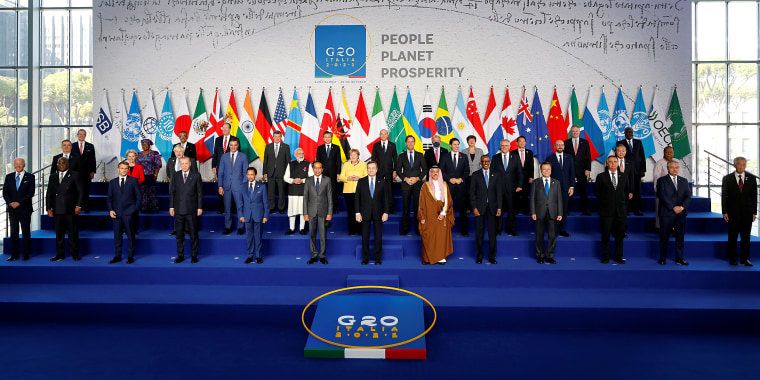ROME — President Joe Biden and other world leaders voiced their support for a global corporate minimum tax at Saturday's closed-door G-20 summit, a monumental agreement that U.S. officials are hoping will lead to an increase in revenue to fund Biden's Build Back Better agenda.
Following the first plenary session on Saturday, a senior Biden administration official said that the leaders "all came out in support of a global minimum tax."
While finance representatives from most G-20 countries have already agreed to implement a 15 percent minimum tax on corporations — ending a race to the bottom on corporate taxation that could keep companies from leaving the U.S. for low-tax countries — approval from heads of state is an important step forward towards implementing the deal.
A final endorsement of the new tax was expected to be included in the joint communique, the statement that G-20 leaders issue at the end of the summit outlining their priorities and actions they agreed to take. Each country will then have to go through their own process to ratify the tax.
An administration official said that the global corporate minimum tax would lead to at least $60 billion in additional revenue every year in the U.S. alone.
Covid, climate change and spiking energy prices were also expected to be high on the agenda during the opening session of the G-20.
"The President underscored his commitment to ending the global pandemic and securing an inclusive global economic recovery, including by supporting developing countries through debt relief," the official said in a statement. "He reminded G20 Leaders that new pandemics can arise any time so it is important that we strengthen global health systems and do more to create the global health security infrastructure to make sure we are prepared against the next pandemic."
In opening remarks on Saturday at La Nuvola, where the summit is taking place, Italian Prime Minister Mario Draghi emphasized the need to come together to tackle some of the world's most complex challenges.
"From the pandemic to climate change to fair and equitable taxation, going it alone is simply not an option," Draghi said. "We must do all we can to overcome our differences. And we must rekindle the spirit that led to the creation of this group."
Biden and other G-20 leaders posed for a group photo before sitting down for the meeting. First responders joined, and several of them took selfies with Biden at the end.
Biden was seen briefly interacting with Turkish President Recep Tayyip Erdogan and British Prime Minister Boris Johnson.
Draghi cautioned the group in his opening remarks that the pandemic was far from over and that more must be done to combat global vaccine inequality.

"In high income countries, more than 70 percent of the population has received at least one dose. In the poorest ones, this percentage drops to roughly 3 percent," he said. "These differences are morally unacceptable and undermine the global recovery."
The Group of 20, an annual gathering of international leaders representing the world’s biggest economies, meets every year to discuss some of the world's most challenging economic problems.
In addition to the United States, the G-20, which was founded in 1999 following a series of global economic crises, includes Argentina, Australia, Brazil, Britain, Canada, China, France, Germany, India, Indonesia, Italy, Japan, Mexico, Russia, Saudi Arabia, South Africa, South Korea, Turkey and members of the European Union.
Combined, member countries make up roughly 80 percent of global GDP and 60 percent of the world population, although some of the most populous countries — such as Pakistan and Nigeria — are not part of the G-20.
In the afternoon, Biden met on the sidelines of the G-20 with British Prime Minister Boris Johnson, French President Emmanuel Macron and German Chancellor Angela Merkel to discuss reviving the 2015 nuclear deal with Iran, known as the Joint Comprehensive Plan of Action, or JCPOA.
"We call upon President Raisi to seize this opportunity and return to a good faith effort to conclude our negotiations as a matter of urgency," the leaders said in a joint statement. "That is the only sure way to avoid a dangerous escalation, which is not in any country’s interest."
Last week Iran’s top nuclear negotiator said Tehran was ready to begin negotiations before the end of November.
In the 2015 deal, widely viewed as the biggest foreign policy achievement of the Obama administration, Iran agreed to stop pursuing the development of nuclear weapons and to allow for international checks on its facilities in exchange for an agreement from the U.S. to roll back sanctions.
Since then-President Donald Trump withdrew from the pact in 2018 and reimposed crippling economic sanctions, Iran has begun enriching uranium to 60 percent purity, near weapons-grade, and has denied inspectors access into some nuclear sites. Iran has also been unable to access tens of billions of dollars of its assets due to U.S. sanctions, which has squeezed its economy.
The president and first lady Jill Biden were also expected to attend a gala dinner Saturday evening with other heads of state at the Quirinale Palace, one of the three official residences of the Italian president.
